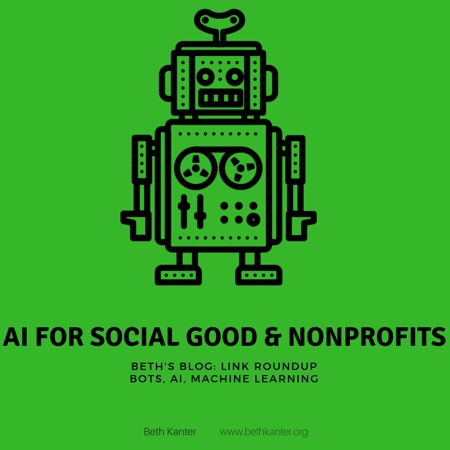
Allison Fine and I have been actively researching and writing about AI for Social Good and Nonprofits. Most recently, we co-authored a policy brief for the Toda Peace Institute on artificial intelligence and its implications for civil society.
We are tracking reports, articles, and new items about AI and Social Good.
Think about AI and bots, and the algorithms that fuel them as tools that can swim through large pools of data pools of data, text, photos, and even videos. AI can do this faster than humans to identify patterns. and insights more quickly. These insights can be used to solve social change problems. As you can imagine, AI is impacting everything in the social sector.
Here are some recent examples:
Can AI Help Combat Workplace Harassment? A San Francisco startup, called Valued just received $1.7 million in seed capital. Their mission is to provide companies with the AI-driven tools they need to stop inappropriate behavior, bias, bullying, and discrimination in the workplace. The platform is described as a “Slack-first” HR platform designed to help managers proactively combat abuse by fostering collaboration, teamwork, and inclusion. Companies add the Valued chatbot to their Slack chatrooms, and employees and management can ping the bot with commands to solicit — and provide — feedback. In the future, the bot will be able to sift through slack channels and identify in appropriate language. (Source: Venturebeat) I shared a few more thoughts on the impact of bots on nonprofit workplace culture here.
Nonprofit in UK Funds Heart Disease Prediction AI Tool: The British Heart Foundation is funding the development of an artificial intelligence (AI) tool that will help predict which people are likely to suffer a heart attack or stroke. The tool is based on health records and could transform the way doctors identify, treat and advise patients at risk of heart disease, says the charity. The development of the tool is through a joint funding partnership between the British Heart Foundation and the Alan Turing Institute and is being carried out by a team of researchers led by the University of Cambridge. (Source: Charity Digital News)
AI for Animal Counts: AI is having an impact on wildlife research by using algorithms to analyze animal photos and videos and yielding data that is not previously been available to scientists. According to the article, AI is completing many tasks typically done manually by researchers, from identifying individual animals from photos for population studies to categorizing the many millions of camera trap photos gathered by field scientists. Machine learning algorithms now have the ability to learn on their own using banks of data. The article shares many examples of how AI is being used in the wildlife research field. (Source: National Geographic)
AI and Libraries: A consortium of 14 public libraries is banding together to look at the potential benefits and risks of AI and public libraries and educate the public. The risks include threats to privacy via the collection, storage, and utilization of vast amounts of data. (Source: Urban Libraries Council Working Group: Press Release)
AI Music and Mental Health Project: In the UK, many young people, called “Carers” are looking after a family member with disabilities or health problems. These caretakers can be particularly vulnerable to social isolation and bullying. This project, a joint effort between the nonprofit gaddum and Manchester Metropolitan University will apply the use of artificial intelligence to explore connection between mood and music. (Source: Charity Digital News)
Beth Kanter is a consultant, author, influencer. virtual trainer & nonprofit innovator in digital transformation & workplace wellbeing.

Leave a Reply